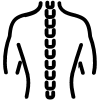With 60 to 80% of adults likely to suffer from lower back pain , backache is a common ailment for many of us.
Although common, back pain should still be a cause for concern. Sometimes, it can indicate serious health problems . That's why it's essential to assess the severity of your back pain .
In this article, find out if your back pain is serious, learn to recognize its symptoms and causes. We also give you some advice on how best to react and the precautions to take.
Symptoms of back pain that should not be ignored

When you have back pain, it is important not to underestimate your symptoms and to know which ones may be masking a serious illness.
Back pain coupled with any of these symptoms should prompt you to seek urgent medical attention.
Pain under the neck

Pain under the neck or in the upper back can be caused by muscle tension or joint problems. Sometimes, it can indicate serious back pain , such as a herniated disc, cervical nerve irritation, or spinal stenosis.
According to a study by the Paris Institute of Spine Surgery , patients suffering from neck pain accompanied by neurological symptoms , such as tingling or weakness in the arms, are more likely to have a serious spinal condition. This study underscores the importance of consulting a specialist promptly to treat both the symptoms and their underlying cause.
Pain accompanied by tingling or numbness in the limbs
Back pain with tingling or numbness in the limbs , such as the arms or legs, indicates compression of a nerve or group of nerves.
Nerve compression can signal a herniated disc, a vertebral fracture, tumors, infections, spinal stenosis (slow narrowing of the spinal canal) or a bone spur (a bony outgrowth around a joint).
If you have difficulty getting up, shuffle your feet when you walk, experience heaviness and loss of control in your legs in addition to your back pain, seek advice from your doctor.
Pain with bladder problems

According to a study published by Wellspect, nerve compression occurs when a nerve is squeezed or pinched due to pressure from bones, surrounding tissues, or intervertebral discs. This can lead to muscle weakness, pain, and tingling in the affected area.
If your back pain is accompanied by an inability to control your bladder , such as loss of urinary control, difficulty urinating, or a feeling that your bladder is not completely empty, this corresponds to a spinal canal disorder.
In this case, the compression of your nerves impacts the transmission of information between your brain and the organs controlled by your nerves , resulting in a temporary loss of bladder control.
This requires immediate intervention to avoid serious complications such as paralysis or permanent nerve damage.
Back pain and fever

In general, a fever can have multiple causes. However, a fever accompanied by back pain can be serious. It could indicate an infection of the spine, kidneys, or an epidural abscess.
An epidural abscess is the presence of pus in the area surrounding the spinal cord and nerve roots. Typical symptoms of this condition include persistent back pain, fever, neck stiffness, and chills.
If you have back pain, fever and chills, consult your doctor.
Possible serious causes behind severe back pain

Herniated disc
A herniated disc occurs when the disc located between your vertebrae shifts out of its normal position. This puts pressure on the nerves located all around it.
Depending on the location of the herniated disc, the pressure can cause numbness, pain, or tingling in your limbs. A herniated disc can be caused by trauma or sudden or repetitive movements .
Spinal fracture
A vertebral fracture refers to a broken or cracked bone in the spine.
It can be caused by a fall, an accident or a contact sport .
Symptoms of a vertebral fracture include loss of sensation in the limbs, persistent back pain , or even, in some cases, a visible deformity of the spine.
Spinal infection
A spinal infection or "spondylodiscitis" is an infection of the discs, bones, or tissues of your spine.
The infection is usually caused by bacteria, viruses, or even fungi .
Symptoms of a spinal infection include fever, chills, and neck pain.
Such an infection requires appropriate treatment to avoid serious complications , such as permanent damage to the nervous system and spinal cord.
Spinal tumor
A spinal tumor corresponds to an abnormal growth of cells in or near the spinal column .
This tumor can cause serious neurological disorders, weakness in the limbs, and numbness.
This type of tumor originates in the bones or tissues around the spine or nerves.
What to do in case of severe back pain?

In case of severe back pain, it is important to react as quickly as possible to prevent it from worsening . As a first step, we advise you to consult a specialist to obtain an accurate diagnosis of your condition.
Getting an appointment with a specialist, such as a chiropractor, physiotherapist, or physical therapist, can take time. Therefore, we recommend that you rest and avoid any inappropriate activity while waiting for your medical appointment.
You can take nonsteroidal anti-inflammatory drugs (NSAIDs) to relieve pain or apply ice to reduce inflammation. Gentle exercises recommended by professionals can also help prevent pain.
Several studies show that strengthening back muscles can relieve and prevent back pain.
For more advice on relieving back pain, whether mild or severe, feel free to consult our articles:
- How to relieve back pain? Simple and effective tips
- Grandma's remedies for back pain: natural and effective
Conclusion
Finally, to know the severity of back pain, you just need to listen to your body to detect symptoms that may indicate abnormal back pain , such as fever, pain under your neck, bladder problems, tingling or numbness in the limbs.
If you experience any of these symptoms, you should consult a healthcare professional as soon as possible to prevent your condition from worsening.

FAQ: How to know if back pain is serious? All the answers to your questions.
How can you tell if back pain is serious?
To determine if back pain is serious, one must consider the intensity of the pain as well as the accompanying symptoms, such as difficulty moving, fever, bladder problems, and sensations of numbness or tingling.
When should you see a doctor for back pain?
Unbearable, debilitating back pain and/or pain coupled with symptoms that may conceal a serious condition (fever, neck, chest or jaw pain, numbness in a limb, loss of sphincter control) should prompt you to consult a healthcare professional quickly.
What does the presence of pain under the neck mean?
Neck pain can be caused by muscle tension, poor posture, or problems such as a herniated disc. If it lasts a long time or worsens, talk to a doctor.
When does back pain accompanied by tingling or numbness in the limbs become a cause for concern?
If these symptoms do not disappear or if you have difficulty moving your limbs, this becomes a cause for concern and may indicate a nerve problem.
What are the potential dangers associated with bladder or bowel problems in cases of back pain?
The potential dangers associated with bladder or bowel problems in cases of severe back pain include contracting a serious illness such as:
- a herniated disc,
- a serious spinal injury,
- or a tumor.
All these diseases are due to severe compression of the nerves or spinal cord and can lead to paralysis of the limbs.
How to distinguish ordinary back pain from back pain associated with fever?
If you have a fever in addition to your back pain for several days, this may indicate severe back pain and hide an infection.












